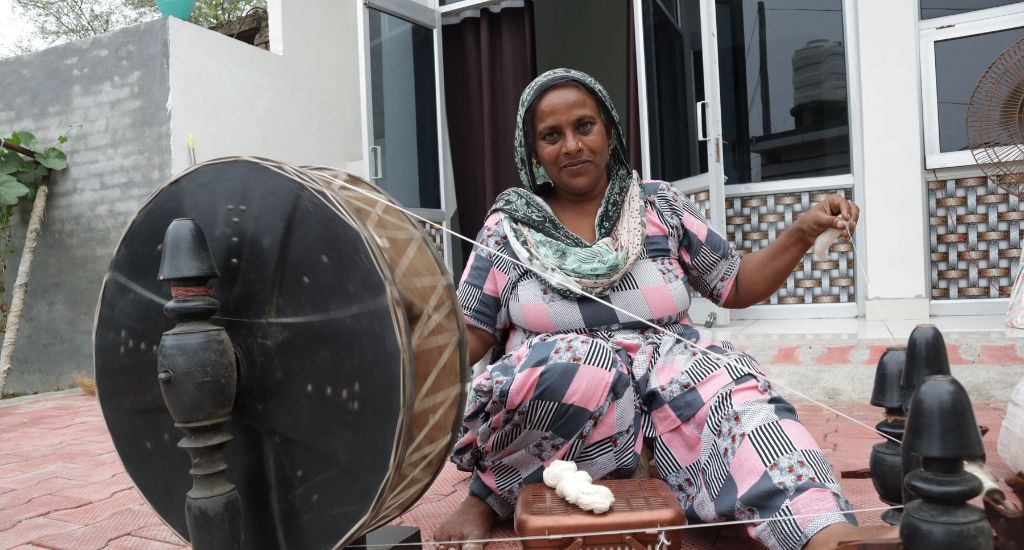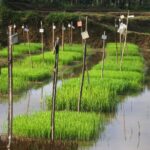Gurcharan Kaur, a resilient soul of 75, weaves the threads of her existence in the summer heat scorching her quiet village of Kotli in Sri Muktsar Sahib district of Punjab. Her hands, weathered by time, find solace in the rhythmic spin of the charkha, a timeless symbol of self-reliance with weaving cotton.
“I am now earning a decent living through this skill. I save my widow pension of Rs 1,500 a month for emergencies,” she said, her voice carrying the weight of wisdom.
In July this year, she spun nearly 15kg of cotton yarn, an act that resonated with tradition and purpose. The fruits of her labour amounted to Rs 2,600, a lifeline that eased her struggle with cataracts and the monthly expense of medicines.
Gurcharan’s handspun yarn, she proudly attests, bears a unique signature, distinct from the others in her village. It is a testament to the legacy she carries forward, a tradition known as “Trinjan” – a ritual of spinning charkha and singing songs, once commonplace among the women of Punjab’s villages.
Also Read: Farmers go green by growing organic cotton

This cotton weaving tradition was buried beneath the wheels of industrialisation, fading from memory. Yet, amidst the shadows of change, a resurgence unfolded. Approximately 27 women, much like Gurcharan, resurrected the art of spinning cotton yarn on charkhas and earning some money. Their hands wove tales of revival, each strand reflecting their enduring spirit.
A women’s collective
These women, dwelling in the villages of Sri Muktsar Sahib and Faridkot districts, were the torchbearers of a renaissance, guided by Rupsi Garg, a spinner herself, who returned to Punjab after delving into development studies.
Rupsi found herself at the helm of Kheti Virasat Mission, a charitable trust advocating organic farming. Here, she unearthed the plight of organic cotton farmers who faced a dearth of markets for their produce. Simultaneously, the age-old tradition of spinning and cotton weaving was eroding, casualties of vanishing cotton supplies.
In 2019, Rupsi breathed life into “Trinjan”, a project within Kheti Virasat Mission. The initiative sought to empower women spinners and weavers by procuring cotton from farmers. This cotton was then lovingly spun into yarn by these women on their cherished charkhas and subsequently transformed into durries, towels, and fabric to be sold.
This initiative, a lifeline in more ways than one, granted the women the opportunity to work from the sanctuary of their homes. Much like the 17.9 million women in India engaged in home-based work, these artisans, 27 in number, contributed to their families’ well-being.
Watch: Punjab women weave ‘rug’ to riches story
Paramjeet Kaur, a 44-year-old mother of two from Kotli village, found solace in the embrace of the charkha. Bound by household duties, she spun in her precious moments of solitude, earning a few hundred rupees every month. For Paramjeet, it meant fulfilling her children’s desires without relying on her husband’s purse strings.
Towards self-sufficiency
Under the benevolent wings of Trinjan, a woman reaps Rs 200 for each kilogram of yarn spun. Paramjeet, much like Gurcharan, began this journey in her youth, learning the art at the tender age of ten. Memories of her mother’s skilful hands crafting trousseaus lingered, a connection to a rich heritage.

“My mother-in-law too used to spin clothes in the village here. But there wasn’t enough cotton grown here like back in my village. Many farmers had stopped it here. Then a time came when I eventually sold my charkha since it was of no use to me,” Paramjit recounted.
However, a mere two months ago, Paramjeet’s life intertwined with the resurgence of tradition. A new charkha graced her home, a symbol of rekindled hope.
Beyond financial empowerment, Rupsi’s initiative bestowed a deeper sense of well-being upon these women. Spinning became more than a source of income. It became a wellspring of happiness, according to Rupsi. As Paramjeet lovingly observes, there’s an indescribable joy that accompanies each turn of the wheel.
Also Read: Glittering Punjabi juttis hide grim story of shoemakers
In a world where tradition often weaves itself into oblivion, Trinjan stands as a testament to resilience. It breathes life into the forgotten melodies of charkhas, rewriting the narrative of these women’s lives. With every thread they spin, they unravel a richer tapestry — a story of empowerment, tradition, and the unyielding spirit of Punjab’s daughters.
The lead image shows Paramjeet Kaur spinning cotton on charkha (Photo by Sanskriti Talwar)
Sanskriti Talwar is an independent journalist who writes about gender, human rights and sustainability. She is Rural Media Fellow 2022 at Youth Hub, Village Square.








